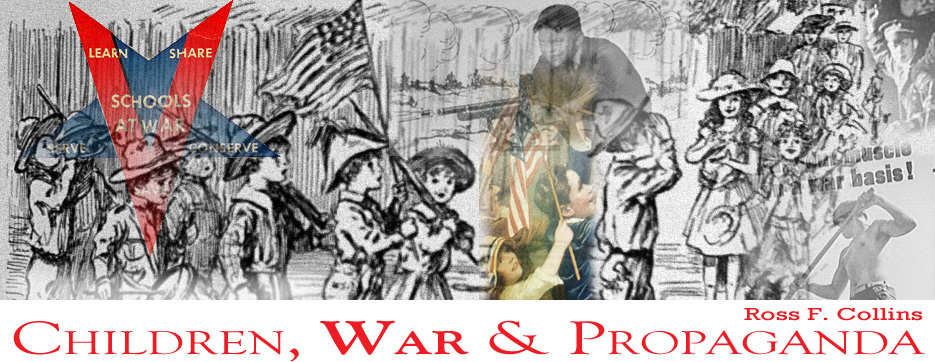
A troubling development...of the brutal century recently passed has been the growing use of children for war. As the world wars changed societies in so many ways, they also changed expectations for children during wartime. In total war, war on an immense, world-wide scale, everyone worked. Including children of all ages. But we have often ignored the wartime contributions of children. What were they expected to do? How did it contribute to the war? How did it affect their lives? This history attempts to respond to these questions, by examining activities of children in the United States during world wars I and II. Modern propaganda helped to draw children into those wars. A variety of authorities participated, in the school, on the playground, at work or at home. They promoted military ideals and activities in hopes these might reduce fear, build character, prepare for service, and even tangibly help the war effort. In doing so, authorities brought war themes to children on a day to day basis, a militarization of American childhood. At the beginning of the twenty-first century, war was not only being fought for the children; it was being fought by the children. This seemed to be a logical progression after it became acceptable to recruit children for wartime needs. As the world seems to be more and more indifferent to mass death, war becomes an natural part of everyday life. From the conclusionWorld war, as told through American propaganda to children, was necessary and just. It was not something to fear, not something to condemn; it was a daily duty, inevitable as rain. It was something fought for patriotic goals beyond the practical needs of the heroic soldiers. Those goals involved children, children most importantly, because children were the future. Soldiers sacrificed much, and sometimes all, for that future, but for those to whom much was given, much was required. Children were expected to join an army of their own, the home front army, mobilized for a war that permeated the culture of the kids. Their duties were myriad; their future might be drafted; their daily life certainly was militarized.
|
 Ross F. Collins is a professor of communication at North Dakota State University, Fargo. He holds a Ph.D. in history from the University of Cambridge, Britain. He has published three books and many articles on aspects of World War I history, French history and United States frontier history. Find out more from his website,
Ross F. Collins is a professor of communication at North Dakota State University, Fargo. He holds a Ph.D. in history from the University of Cambridge, Britain. He has published three books and many articles on aspects of World War I history, French history and United States frontier history. Find out more from his website, 